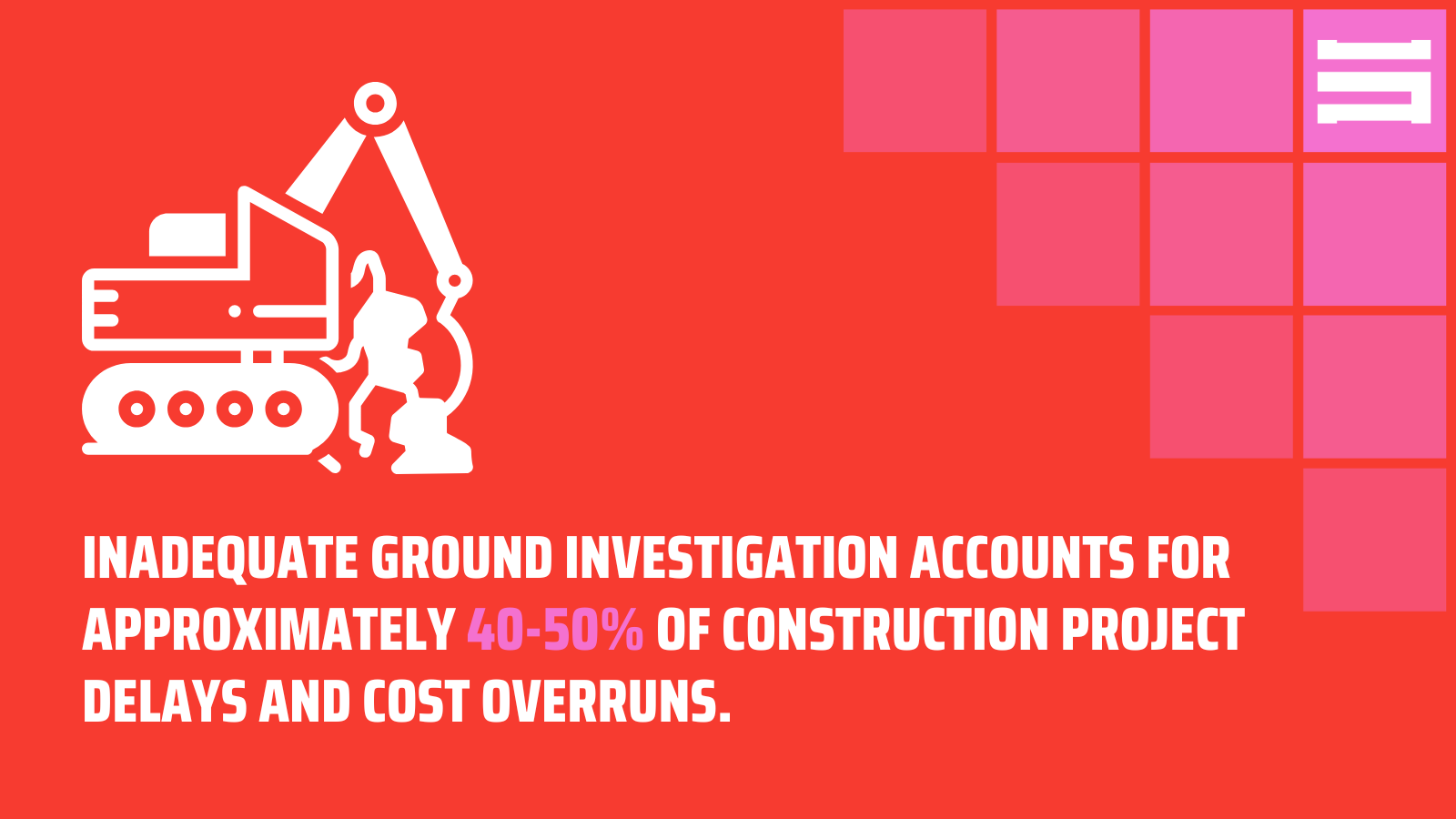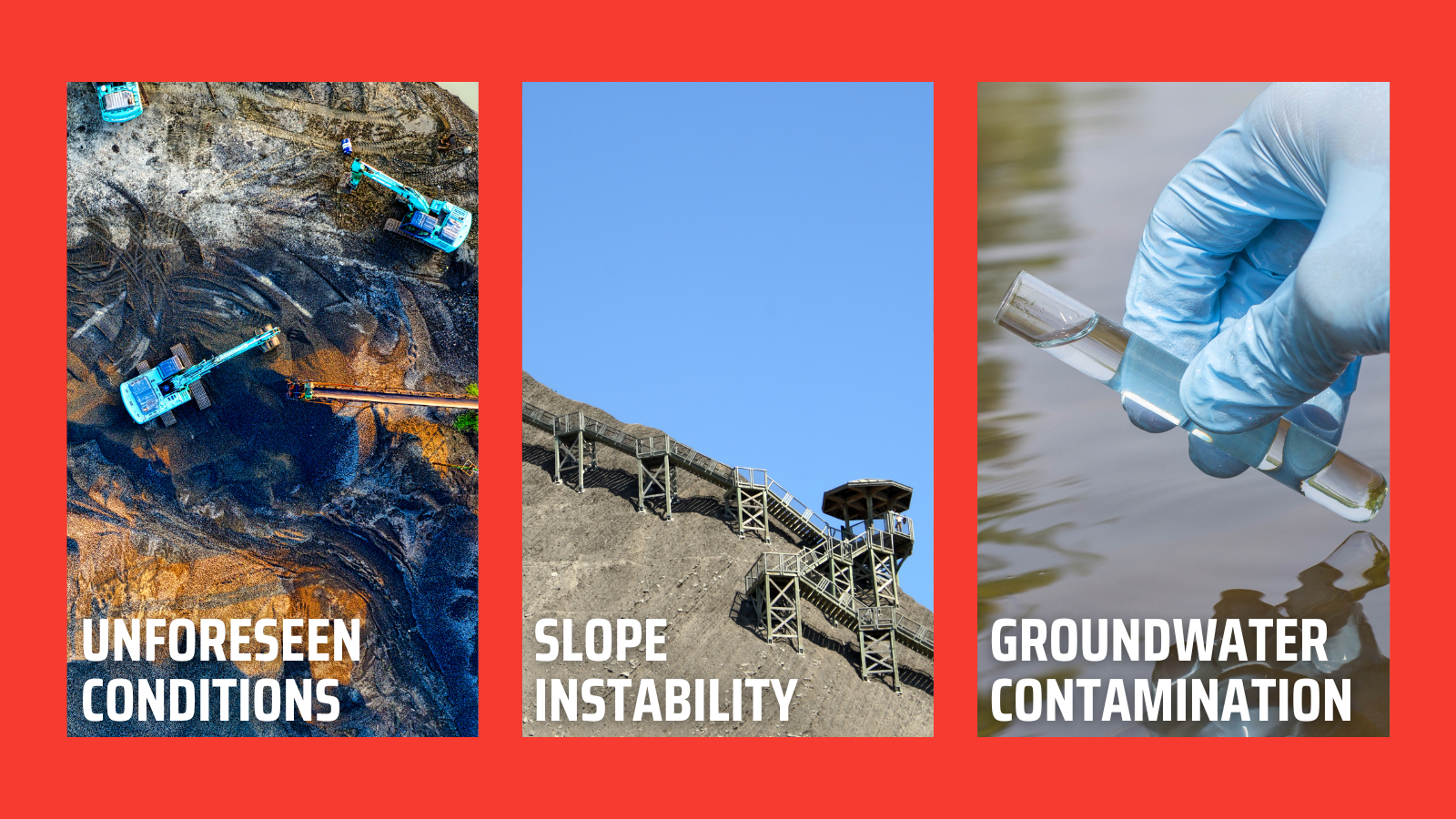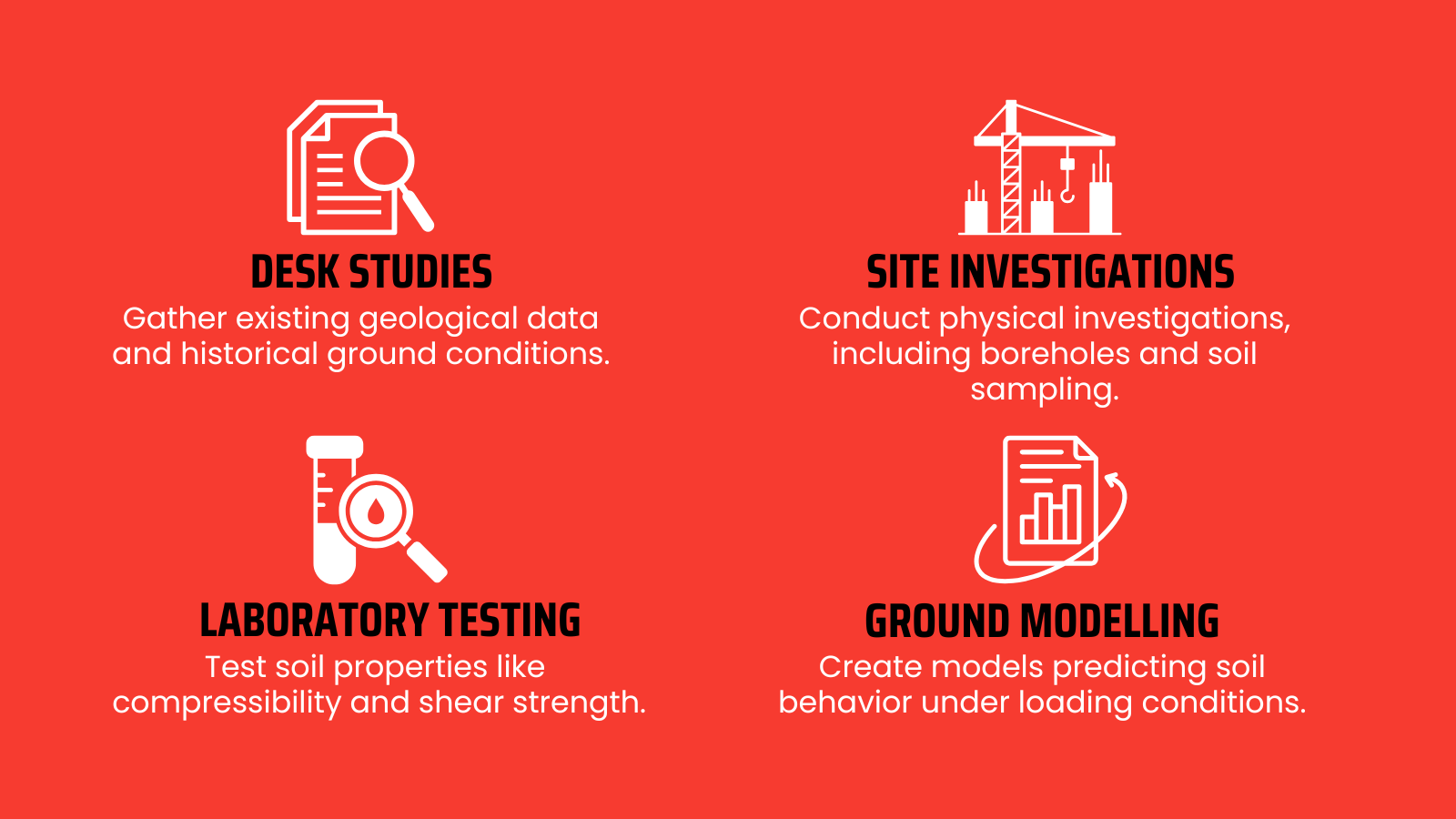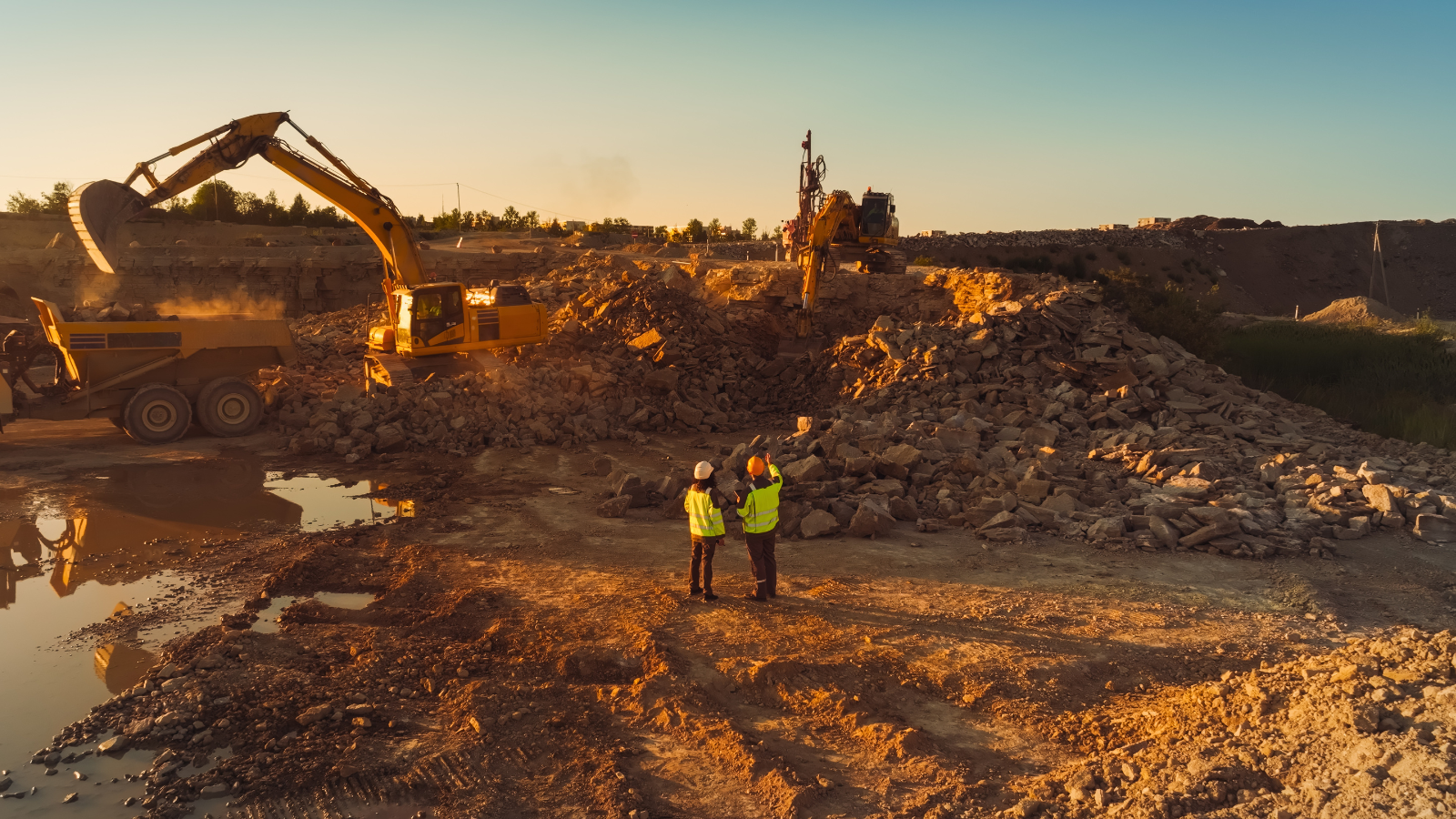In the vast and intricate world of construction, ensuring the stability and safety of structures is paramount. This is where geotechnical and ground engineering play a vital role. These specialised fields focus on understanding the earth's physical properties and how they interact with the infrastructure built upon them. Whether designing foundations, roads, tunnels, or dams, geotechnical engineers assess risks related to soil, rock, and groundwater conditions, helping mitigate potential hazards and ensuring that projects are structurally sound from the ground up.
In this blog, we will delve into the significance of geotechnical engineering, its approaches, benefits, challenges, and emerging trends. We will also highlight the services offered by ground engineering consultants and explore how these services align with the needs of modern construction projects.
Understanding the Importance of Geotechnical Engineering in Construction
Geotechnical engineering is a sub-discipline of civil engineering that focuses on the behaviour of earth materials and their interaction with man-made structures. It involves using scientific methods to evaluate the suitability of soil, rock, and groundwater conditions for construction projects. From skyscrapers to highways, geotechnical engineers ensure that the foundation of every structure is stable and secure.
Their work begins with a detailed assessment of ground conditions, often involving desk studies, site investigations, and laboratory tests. This is followed by recommendations on foundation design, slope stability, and groundwater management. The insights provided by geotechnical engineers are crucial in determining whether a project is feasible and safe to build on a specific site. According to global industry reports, inadequate ground investigation accounts for approximately 40-50% of construction project delays and cost overruns. This is why ensuring proper geotechnical assessments from engineers can significantly reduce these risks.

The Role of Geotechnical Engineers in Construction
A geotechnical engineer's responsibilities are vast and varied, encompassing several critical tasks that impact a project’s success. Their involvement is crucial from the very start, as they perform soil assessments and determine ground stability. These engineers also monitor construction activities to ensure compliance with safety regulations and the proper handling of geotechnical risks.
One of the main roles of a geotechnical engineer is conducting site feasibility assessments. This involves evaluating the physical properties of the soil and rock beneath a construction site to determine if it can support the intended structure. Factors like soil composition, density, and moisture content can significantly impact construction decisions. Geotechnical engineers also consider environmental factors, such as flooding or seismic risks, which could affect long-term stability.
Another vital role is advising on foundation design. The type of foundation used depends on the soil characteristics and the load-bearing capacity of the ground. Engineers design foundations to distribute the weight of the building evenly, preventing settlement, cracks, or potential failure. In the case of challenging terrains, such as slopes or areas with high groundwater levels, geotechnical engineers must implement advanced solutions like retaining walls or piling.
The Biggest Challenges Encountered in Ground Engineering

Ground engineering plays a critical role in modern construction, but it is not without its unique challenges. These projects demand a high level of technical expertise and thorough planning to tackle the unpredictable nature of ground conditions. Effectively addressing these challenges can determine whether a project succeeds or fails, making the role of geotechnical engineer’s indispensable. Below are some of the most prominent challenges in ground engineering and how experts manage them.
1. Managing Unforeseen Ground Conditions
One of the most significant challenges in ground engineering is dealing with unforeseen ground conditions. Despite extensive site investigations and desk studies, unexpected soil types, rock configurations, or groundwater conditions can emerge during construction. These surprises can cause delays, increase costs, and may even require redesigns. For example, encountering high water tables or clay layers that were undetected during preliminary testing can necessitate additional drainage solutions or adjustments to the foundation design.
To reduce these risks, engineers often recommend more comprehensive ground investigations, which include multiple techniques such as borehole drilling, trial pits, and geophysical surveys. These methods offer a more detailed understanding of subsurface conditions, minimising the chance of unexpected discoveries during the construction phase.
2. Slope Stability and Landslide Risk
Slope stability is another crucial concern, particularly in hilly or mountainous regions prone to landslides, erosion, or rockfalls. Natural forces such as rainfall, seismic activity, and gravity can destabilise slopes, threatening infrastructure and safety. Geotechnical assessments must include an in-depth analysis of slope conditions to identify potential risks. Failure to address slope stability can lead to severe consequences, including the collapse of retaining walls, road blockages, or structural failures. (Read more about structural engineering here)
Engineers use various techniques to stabilise slopes, such as installing retaining walls, soil reinforcement methods (e.g., using geogrids or soil nails), and improving drainage systems to manage water flow. In some cases, vegetation is introduced to help bind the soil, reducing the risk of erosion.
3. Groundwater Management and Contamination
In urban and industrial areas, managing groundwater is often a significant challenge, particularly when contamination from historical industrial activities is present. Contaminated groundwater can pose health risks, affect construction materials, and cause environmental damage if not properly managed. Additionally, excessive groundwater or high-water tables can complicate excavation and foundation construction, requiring dewatering processes or specialised waterproofing methods to ensure long-term structural integrity.
Geotechnical engineers typically work alongside environmental engineers to assess contamination levels and implement solutions such as groundwater barriers, filtration systems, or environmental remediation techniques. These measures not only protect the construction site but also ensure compliance with environmental regulations.
4. The Impact of Climate Change on Ground Engineering
The accelerating impacts of climate change are introducing new challenges for ground engineering projects. Increased rainfall, rising sea levels, and more frequent extreme weather events are making it more difficult to accurately predict ground conditions. Coastal areas are particularly vulnerable to sea-level rise, which can lead to soil erosion, flooding, and changes in groundwater levels. Inland, the increasing frequency of heavy rain can cause soil saturation, landslides, or even sinkholes in areas where the ground cannot adequately drain water.
To adapt to these shifting conditions, modern ground engineering projects must incorporate climate resilience into their designs. This might involve designing for future flood levels, reinforcing foundations to withstand soil erosion, or implementing advanced drainage systems capable of handling higher volumes of water. Engineers must also consider long-term climate projections to ensure that infrastructure remains stable and safe well into the future.
5. Dealing with Legacy Infrastructure in Urban Areas
In many urban environments, particularly older cities, construction projects often encounter pre-existing infrastructure, such as old utility lines, tunnels, or foundations. This can significantly complicate ground engineering work, as disturbing or damaging these structures can lead to costly repairs, service disruptions, or safety hazards. Furthermore, the presence of older infrastructure may restrict certain types of construction methods or require additional protective measures during excavation.
Challenges in ground engineering are varied and complex, but they also present opportunities for innovation and the application of advanced engineering solutions. From managing unforeseen ground conditions to adapting to the effects of climate change, ground engineers must continuously evolve their methods to ensure the safety, stability, and longevity of construction projects. By leveraging the latest technologies and adopting a proactive approach to risk management, geotechnical engineers help build resilient infrastructure that stands the test of time.
Geotechnical Engineering for Construction Projects: Why is it Significant?
Ensuring Safety
Ground engineering is crucial for ensuring the safety of construction projects. By thoroughly assessing ground conditions before any building begins, geotechnical engineers can identify potential hazards such as unstable soil, landslides, or sinkholes. Addressing these risks early helps prevent structural failures, ensuring that foundations are stable and capable of supporting the intended load. This proactive approach minimises the risk of accidents and ensures the long-term stability of the infrastructure.
Cost Efficiency
Early detection of ground issues through geotechnical investigations helps prevent costly delays, redesigns, or remediation. Identifying unsuitable soil conditions before construction allows the project team to modify the design, accordingly, saving significant time and resources. By addressing potential problems upfront, construction projects can avoid unnecessary expenditures, ensuring that budgets are managed effectively and that the project proceeds smoothly without unexpected cost overruns.
Environmental Impact
Ground engineering contributes to the sustainability of construction projects by minimising environmental disruption. Geotechnical engineers design solutions that interact with the natural landscape, such as incorporating natural drainage systems or using eco-friendly materials for soil stabilisation. These approaches reduce the environmental footprint of the project, protect local ecosystems, and contribute to long-term climate resilience, ensuring that infrastructure remains functional even under changing environmental conditions.
Construction Design
Ground engineering enables the creation of foundation designs tailored to specific ground conditions, enhancing overall structural performance. By optimising the foundation and utilising methods such as soil reinforcement or ground improvement, engineers can make challenging sites suitable for construction. This not only increases the efficiency of the design process but also ensures that materials are used more effectively, reducing the need for over-engineering and improving the cost-effectiveness of the project.
Project Approval
Comprehensive ground engineering ensures that construction projects meet local, national, and international safety standards. Thorough geotechnical reports demonstrate that potential risks have been assessed and mitigated, helping to expedite the planning and approval processes. By showing regulators that all ground-related issues have been addressed, projects are more likely to receive swift approval, ensuring compliance with environmental and construction regulations, and reducing the risk of legal or regulatory setbacks.
Potential Long-Term Risks
Ground engineering helps mitigate long-term risks by ensuring that structures are designed to withstand future ground conditions. This includes addressing risks such as soil settlement, erosion, or groundwater issues that could compromise the integrity of the building over time. By incorporating solutions that consider long-term ground behaviour, engineers create infrastructure that is durable, resilient, and capable of withstanding environmental changes, including the effects of climate change, for decades to come.
Geotechnical Engineering Services: The Functions to be Performed

In geotechnical engineering, several approaches and methodologies are used to assess and manage ground conditions. These include:
- Desk Studies: The first step in any ground engineering project involves collecting existing data about the site. This includes geological maps, previous site investigations, and historical records of ground conditions.
- Site Investigations: After a desk study, engineers conduct physical investigations, such as drilling boreholes, digging trial pits, and collecting soil samples. These methods provide valuable data on the soil’s characteristics, including its composition, strength, and moisture content.
- Laboratory Testing: Once samples are collected, they are tested in a laboratory to determine properties like compressibility, permeability, and shear strength. This data is essential for designing foundations and other structures.
- Ground Modelling: Engineers use the data collected during site investigations to create a detailed model of the ground conditions. This model helps predict how the soil and rock will behave under different loading conditions, allowing for more accurate and effective design solutions.
The Emerging Trends and Opportunities in Geotechnical Engineering
The field of geotechnical and ground engineering is evolving rapidly, with several emerging trends shaping the future of construction. One such trend is the increasing use of digital technology. Advanced software tools, like Building Information Modelling (BIM), are being used to create detailed 3D models of ground conditions. This allows engineers to simulate different scenarios and optimise designs for safety and efficiency.
Another trend is the growing focus on sustainable engineering. As the construction industry seeks to reduce its environmental impact, geotechnical engineers are developing new techniques to minimise the use of natural resources and reduce carbon emissions. This includes using recycled materials for soil stabilisation and designing foundations that require less concrete.
Additionally, there is a rising demand for climate-resilient infrastructure. Geotechnical engineers are at the forefront of designing structures that can withstand extreme weather events, such as floods and landslides. By incorporating climate risk assessments into their designs, they help ensure that infrastructure remains safe and operational in the face of environmental changes.
Conclusion
In the world of construction, geotechnical and ground engineering are indispensable. These disciplines provide the foundation for every building, road, and tunnel, ensuring that structures are safe, stable, and sustainable. As the challenges of climate change and urbanisation continue to grow, the role of geotechnical engineers will become even more critical.
About us
Stonehaven is a trusted project management company and construction consultant based in Dubai, offering comprehensive construction management services across the UAE with offices located in Dubai, UK and Sri Lanka. As one of the leading project management companies in Dubai, we manage projects from inception to completion, ensuring quality, efficiency, and cost-effectiveness at every stage.
We deliver value through expert project management consultancy services, tailored to meet the unique needs of each client. Our core services include Cost Management, Project Management, Construction Supervision, Engineering Support, Design Support, and Marketing & Communications. Whether you’re looking for construction consultants or project managers in the UAE and wider GCC region, Stonehaven is your trusted partner for achieving excellence in your next project.
Stonehaven is a leading provider of ground engineering consultancy services. We offer a full range of services, including geotechnical assessments, foundation design, slope stability analysis, and groundwater management. Our mission is to deliver safe, sustainable, and cost-effective solutions for construction projects of all sizes. Contact us today to learn how our ground engineering consultants can support your next project and ensure its long-term success.
Explore our comprehensive ground engineering services at Stonehaven and let us help you build a strong foundation for the future.








